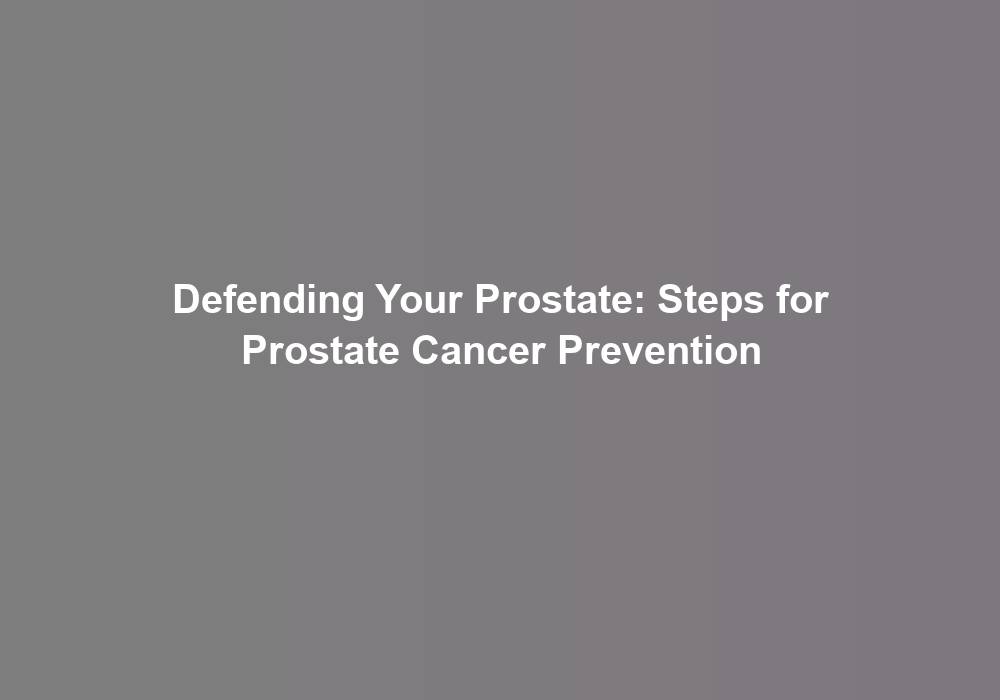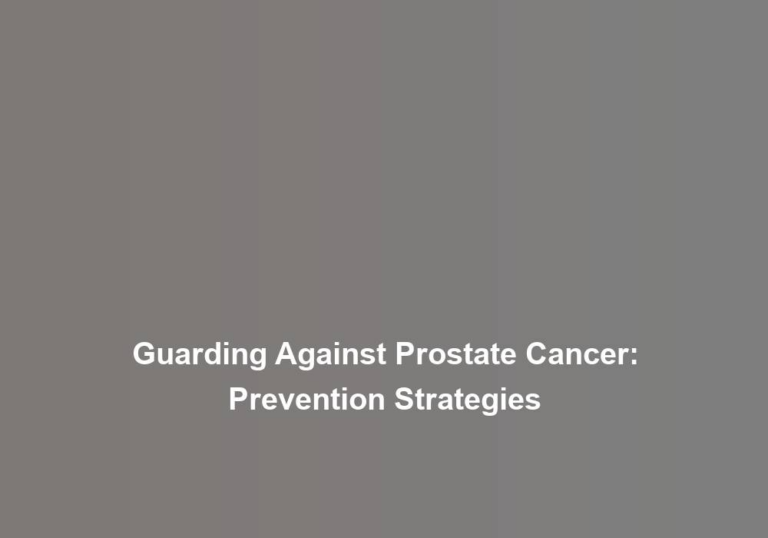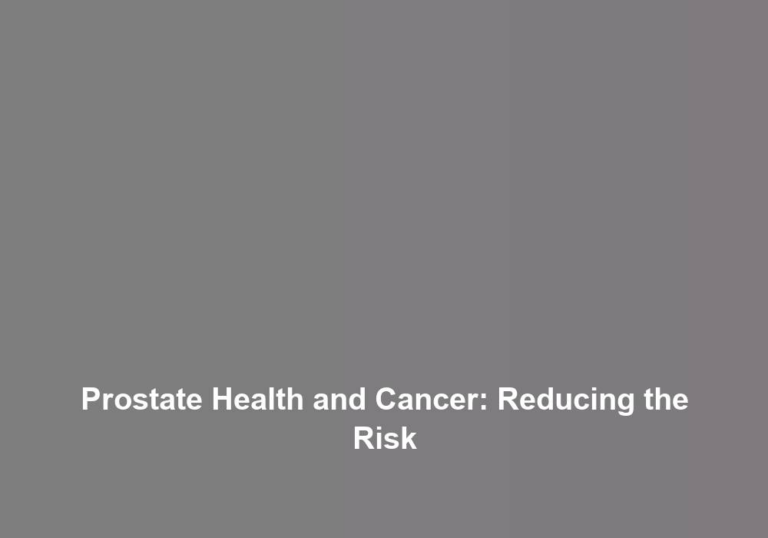Defending Your Prostate: Steps for Prostate Cancer Prevention
YouG??ve likely heard about the importance of prostate health, but itG??s time to take a proactive approach to defend against potential risks. As men age, the prostate becomes increasingly susceptible to various health concerns, including prostate cancer. However, there are steps you can take to reduce your risk and promote a healthy prostate. By learning about the factors that contribute to prostate cancer and understanding how diet, exercise, and regular screenings play a crucial role, you can actively safeguard your prostate health. ItG??s time to take charge of your well-being and make informed decisions to protect your prostate for the long haul.
Understanding Prostate Cancer Risk Factors
To understand the risk factors for prostate cancer, it is essential to recognize the various factors that can contribute to an individualG??s likelihood of developing this disease. Genetic predisposition plays a significant role in prostate cancer risk. If you have a family history of prostate cancer, particularly in a first-degree relative such as a father or brother, your risk may be higher. Research suggests that certain inherited genetic mutations can increase the likelihood of developing prostate cancer. Therefore, it is crucial to be aware of your familyG??s medical history and discuss it with your healthcare provider.
In addition to genetic predisposition, environmental influences can also impact prostate cancer risk. Exposure to certain environmental factors, such as certain chemicals or toxins, may contribute to an increased risk of developing prostate cancer. For instance, individuals who are regularly exposed to pesticides, heavy metals, or other harmful substances in their occupation or living environment may face a higher risk. ItG??s important to take necessary precautions and follow safety guidelines when working with potentially hazardous materials to minimize the risk of exposure.
Understanding these risk factors can empower you to make informed decisions about your health. By staying informed about your genetic predisposition and minimizing exposure to environmental influences, you can take proactive steps to reduce your risk of developing prostate cancer. Regular screenings and discussions with your healthcare provider can further support early detection and intervention if necessary.
Incorporating a Prostate-Healthy Diet
Incorporating a prostate-healthy diet is an essential component in reducing your risk of developing prostate cancer, building upon the understanding of genetic predisposition and environmental influences on the disease. By making conscious dietary choices, you can positively impact the health of your prostate and potentially lower the risk of developing prostate cancer. Here are some practical steps you can take to incorporate a prostate-healthy diet:
-
Increase Consumption of Fruits and Vegetables:
-
Aim to include a variety of colorful fruits and vegetables in your daily meals. These are rich in vitamins, minerals, and antioxidants, which can help reduce inflammation and oxidative stress in the body.
-
Choose Healthy Fats:
-
Opt for sources of healthy fats such as nuts, seeds, and fatty fish like salmon. These foods contain omega-3 fatty acids, which have been associated with a lower risk of developing prostate cancer.
When it comes to dietary supplements, some research suggests that certain nutrients like vitamin D and selenium may play a role in prostate cancer prevention. However, itG??s important to consult with a healthcare professional before starting any dietary supplements, as excessive intake of certain supplements may have adverse effects. Additionally, maintaining a healthy weight and staying physically active can complement the benefits of a prostate-healthy diet, further reducing the risk of prostate cancer.
Regular Exercise and Its Impact
Regular physical exercise has been shown to have a significant impact on reducing the risk of developing prostate cancer. Studies have indicated that engaging in regular exercise can lower the likelihood of developing aggressive forms of prostate cancer. Additionally, it can also positively impact symptoms and overall quality of life for individuals already dealing with prostate cancer.
Impact of Regular Exercise on Prostate Cancer
| Exercise Frequency | Impact on Symptoms |
|---|---|
| 3-4 times a week | Reduced fatigue and anxiety |
| 5-7 times a week | Improved urinary function |
| Daily exercise | Lower risk of disease advancement |
Regular physical activity, such as brisk walking, swimming, or cycling, can aid in maintaining a healthy body weight, reducing inflammation, and regulating hormone levels, all of which are factors that can influence prostate cancer risk. Exercise also plays a crucial role in managing symptoms commonly associated with prostate cancer, such as fatigue and urinary problems. It is recommended to engage in at least 150 minutes of moderate-intensity exercise per week, spread out over several days. However, more frequent or intense exercise may provide even greater benefits.
Importance of Regular Prostate Screenings
Ensure annual prostate screenings for early detection and effective management of potential cancer risks. Prostate cancer is highly treatable when detected early. Regular screenings can help identify any abnormalities in the prostate gland, allowing for timely intervention and improved outcomes. HereG??s why regular prostate screenings are crucial:
-
Early Detection: Prostate cancer often presents with no symptoms in its early stages, making regular screenings vital for early detection. By identifying the cancer in its initial phases, treatment can be more effective and less invasive.
-
Screening Guidelines: Following screening guidelines based on age, family history, and risk factors is essential. For most men, screenings should commence at age 50, while those with a family history of prostate cancer or other risk factors may need to start earlier. Consulting with a healthcare professional to determine the appropriate screening schedule is imperative for proactive cancer management.
Regular screenings provide the opportunity for early intervention, potentially preventing the spread of cancer and improving the chances of successful treatment. By adhering to screening guidelines and not delaying annual check-ups, you empower yourself with knowledge and take an active role in safeguarding your prostate health. Remember, the goal of regular screenings is not just to detect cancer but to ensure your overall well-being.
Lifestyle Changes for Prostate Cancer Prevention
To reduce your risk of prostate cancer, adopt healthy lifestyle habits such as maintaining a balanced diet and engaging in regular physical activity. Dietary modifications play a crucial role in prostate cancer prevention. Aim to include a variety of fruits, vegetables, and whole grains in your diet. Foods rich in antioxidants, such as tomatoes, broccoli, and green tea, may help reduce the risk of developing prostate cancer. Additionally, limiting the intake of red and processed meats, as well as high-fat dairy products, can contribute to a lower risk of prostate cancer. Omega-3 fatty acids found in fish can also be beneficial, so consider incorporating fish into your diet.
Stress management is another important aspect of lifestyle changes for prostate cancer prevention. Chronic stress can have a negative impact on your overall health, including increasing the risk of developing prostate cancer. Engage in activities that help you manage stress, such as meditation, yoga, or spending time in nature. Regular exercise is also a powerful tool for stress reduction. Aim for at least 150 minutes of moderate-intensity exercise per week, such as brisk walking, swimming, or cycling.
Conclusion
In conclusion, defending your prostate from cancer requires understanding risk factors, maintaining a prostate-healthy diet, regular exercise, and undergoing regular screenings. By taking proactive steps and making lifestyle changes, you can significantly reduce your risk of developing prostate cancer. Just as a fortress is fortified to withstand attacks, your body can be fortified through these measures to protect against the threat of prostate cancer. Stay vigilant and prioritize your prostate health to guard against this disease.







